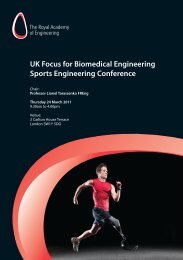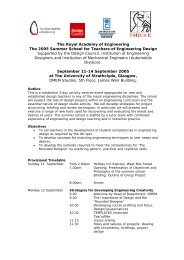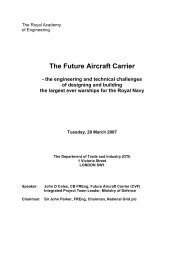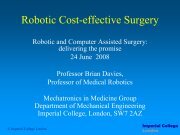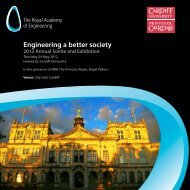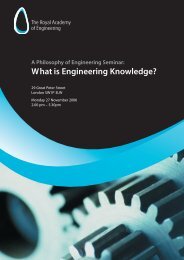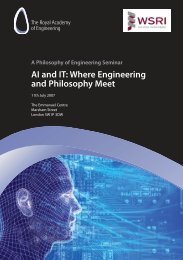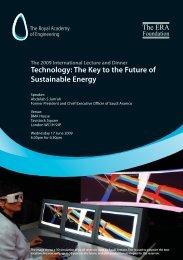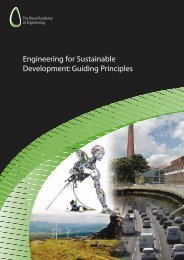Engineering graduates for industry - Royal Academy of Engineering
Engineering graduates for industry - Royal Academy of Engineering
Engineering graduates for industry - Royal Academy of Engineering
You also want an ePaper? Increase the reach of your titles
YUMPU automatically turns print PDFs into web optimized ePapers that Google loves.
employers and their satisfaction with <strong>graduates</strong> are in commercial awareness and relevant work experience – which<br />
raises concerns about the decline in under<strong>graduates</strong> taking up placements. Similarly, employers who took part in the IET<br />
skills survey identified practical experience as most wanting in <strong>graduates</strong> and also identified the need to improve the<br />
curriculum and degree content.<br />
Employers in the CIHE report also value <strong>graduates</strong> who have a global perspective, as global issues such as<br />
environmental sustainability and social responsibility are becoming increasingly important, with a need <strong>for</strong> more<br />
integrated, multi-disciplinary teams to tackle problems such as climate change and poverty. Recognising that the<br />
engineering curriculum is already overcrowded, skills such as critical thinking, multi-disciplinarity, teamworking, working<br />
across cultures and contexts and systems thinking, as well as strong interpersonal and communication skills, need to be<br />
embedded across it 29 .<br />
It is important to emphasise that seeking this balance <strong>for</strong> which all argue does not mean simply increasing course<br />
content. The two sets <strong>of</strong> skills can be, indeed are best, taught alongside each other using ‘s<strong>of</strong>t’ skills in the context <strong>of</strong><br />
technical skills.<br />
Other stakeholders in engineering education<br />
It is worth noting that <strong>industry</strong> is just one <strong>of</strong> the key stakeholders, and engineering education also needs to meet the<br />
needs <strong>of</strong> the students (as the direct beneficiaries) and staff involved with delivering the curriculum.<br />
The final stakeholder group is society, which has its own goals <strong>for</strong> engineering education. Issues such as sustainable<br />
development and globalisation need to be addressed by engineering educators. In addition, changes to engineering<br />
degrees in the UK must meet requirements <strong>for</strong> quality as set by universities and external bodies such as the Quality<br />
Assurance Agency (QAA), pr<strong>of</strong>essional standards <strong>for</strong> accreditation and the compatibility <strong>of</strong> qualifications within a<br />
common educational framework in Europe as indicated by the Bologna Declaration (1999) 30 . For engineering courses,<br />
the Accreditation Standard (UK-SPEC) 31 is a valuable tool available to the pr<strong>of</strong>ession and employers in degree<br />
accreditation, under the auspices <strong>of</strong> the <strong>Engineering</strong> Council. The emphasis <strong>of</strong> the Standard is on the value <strong>of</strong> design<br />
as a means to integrate knowledge and understanding and universities have the freedom to plan and resource<br />
programmes, provided they achieve the required outcomes. Accreditation by pr<strong>of</strong>essional bodies could be used as a<br />
lever to encourage the adoption <strong>of</strong> experience-led components.<br />
Although the focus <strong>of</strong> this study is on changes to the undergraduate curriculum as delivered on the campus, it is<br />
acknowledged that the focus <strong>for</strong> the future, as set out in Higher Ambitions, is <strong>for</strong> “a greater diversity <strong>of</strong> models <strong>of</strong> learning:<br />
part-time, work-based, foundation degrees and studying whilst at home”. The demographics <strong>of</strong> students are already<br />
changing, with UCAS acceptances <strong>for</strong><br />
<strong>Engineering</strong> and Technology (E&T) 2007/08<br />
showing 26% mature entrants (over 25 years<br />
old) 32 and the most recent HESA figures show a<br />
total <strong>of</strong> 103,760 E&T under<strong>graduates</strong> <strong>of</strong> whom<br />
23,335 are part-time (22%) 33 . The number <strong>of</strong><br />
work-based students is set to rise with the<br />
predicted low point in the number <strong>of</strong> 18 year<br />
olds by 2020. Work-based courses are already<br />
being developed, such as the <strong>Engineering</strong><br />
Council’s Gateways Scheme 34 which provides<br />
flexible pathways to becoming a pr<strong>of</strong>essional<br />
engineer.<br />
29<br />
Bourn and Neal (2008) The Global Engineer – Incorporating global skills within UK higher<br />
education <strong>of</strong> engineers<br />
30<br />
www.bologna-bergen2005.no/Docs/00-Main_doc/990719BOLOGNA_DECLARATION.PDF<br />
31<br />
www.engc.org.uk/ecukdocuments/internet/document%20library/AHEP%20Brochure.pdf<br />
32<br />
www.ucas.ac.uk<br />
33<br />
www.hesa.ac.uk<br />
34<br />
www.engineeringgateways.co.uk/<br />
12 The <strong>Royal</strong> <strong>Academy</strong> <strong>of</strong> <strong>Engineering</strong>





